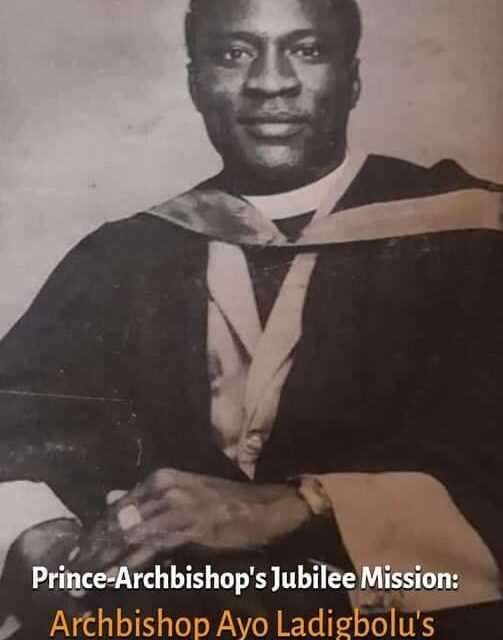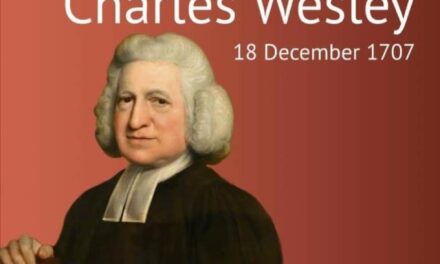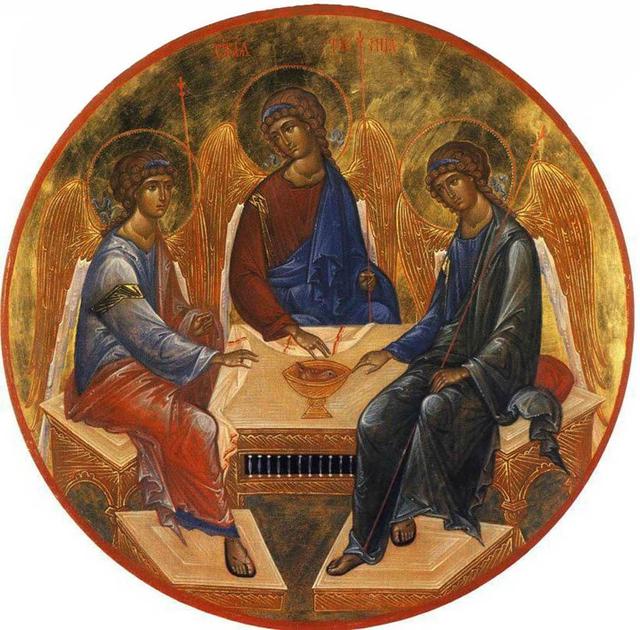A prince, a member of a monarch’s or former monarch’s family is a male ruler ranked below a king. Prince Sanda Ayoade Ladigbolu from Agunloye ruling house in Oyo is a direct grandson of Oba Siyanbola Onikepe Ladigbolu 1. It is on record that ‘in 1938 Oba Siyanbola Onikepe, the eldest son of Oba Lawaru Amubieya, had reigned for twenty eight years (1911- 1938) when his son and one of the apples in the Oba’s eyes, Prince (Alhaji) Akee Obayanrintan Apewo Ladigbolu and Aya Omoba Aderonke got their baby boy, the grandson for the Oba, Prince Sanda Ayoade Ladigbolu.’ Prince as a title of the highest nobility, often hereditary ‘possesses more acknowledges and higher social status than most other classes in society.’ From the beginning, Prince Ayo Ladigbolu carries a lifelong princely duty to uphold various social responsibilities, such as honourable behaviour and leadership position. In furtherance of Wesley’s theology that revolves around the importance of salvation, Prince Ayo Ladigbolu’s ‘One Way’ theology and guiding philosophy since his conversion is about fishing for men and women to know and follow Christ. According to him, “God sent someone to fish for me, and once I entered the Christ family, I received the Holy Spirit and passion to fish for others. No hesitation at all in using every opportunity at my disposal to invite young and old into Christ family.”
Prince Ayo Ladigbolu beyond upholding various social responsibilities, this year marks prince-archbishop’s Jubilee celebration of his Methodist ministry climaxed with the episcopal leadership position of an Archbishop in Methodist Church Nigeria. Congratulations to a Prince on God’s mission, His Grace, Most Rev Lawrence Sanda Ayoade Ladigbolu for an eventful 50 years in Methodist ministry. What an amazing accomplishment, dad. Your Christian conversion, faith, patience, leadership, and perseverance in pursuing the Lord has truly blessed Methodist Church Nigeria, the community, and the world as your parish. A prince-archbishop, unlike elected monarch is a bishop who is also recognised traditionally and could wholly or largely overlap with his local or city of his residence or official diocesan jurisdiction. Prince-archbishop’s Jubilee mission is about Archbishop Ayo Ladigbolu’s visible expression of missional patriotism as a man of God and a Prince of Oyo Kingdom. According to the Alaafin of Oyo, His Imperial Majesty, Oba Lamidi Olayiwola Adeyemi (III), there is a visible ‘passion and persistence in the Arch-Bishop and I must confess, no one has beaten him in the race and contribution for our development and aspiration.’
Prince-archbishop’s Jubilee mission is anchor on Archbishop Ayo Ladigbolu’s first loyalty to Jesus Christ without jettisoning ‘a thorough and dedicated path of loyalty, respect and admiration for the person and throne of the Alaafin. Using the words of the Alaafin, ‘this hall-mark of loyalty has put my estimation of the character of the arch-bishop (Ladigbolu) as one hundred percent refined and excellent.’ In an age and culture where one can use position or ‘religion as a ploy to option of aloofness … one can feign a fellowship. One can laugh and smile, while the opposite is what is burning in the heart,’ Prince-archbishop’s Jubilee mission is a model of Gospel commitment and peaceful coexistence with others.
Prince-archbishop’s Jubilee mission is with human face especially, care for the needy and vulnerable in the society. As a missional and a social bridge for the development of his immediate community, Archbishop Ayo Ladigbolu is still serving as the founding chairman, Oyo Metropolitan Development Association formed in 2009 and registered in 2016. On Thursday 20th August, 2020, 7.7 million naira was distributed as a relief fund to the victims of the Akesan Market, Oyo, fire tragedy that occurred in January, 2020. Prince-archbishop’s Jubilee mission is extended for the care of ‘the poor handicapped members of the society in Durbar and the H.I.V and Aids Victims in Oyo.’ Archbishop Ayo Ladigbolu is currently the Spiritual father of Atiba University in Oyo State.
Born on the 27th of June, 1938, Archbishop Ayo Ladigbolu grew up in the palace of the Alafin of Oyo. He was sent to the Arabic/Islamic training school and ‘was tutored in the traditions and culture of the royal court.’ Archbishop Ayo Ladigbolu, as a child was ‘not spared any discipline that normal school child should get.’ In 2018, the Alaafin, a cousin to Archbishop Ayo Ladigbolu in his tribute to mark the Archbishop’s 80th birthday explained that Archbishop Ayo Ladigbolu ‘spent the first fourteen years in the Koranic and Arabic School before entering the L.A. Primary School, lsale-Oyo at the age of fourteen in 1952. He got double promotion twice at L. A. Secondary Modern School Durbar, he distinguished himself in football. Cultural art production and these activities were already putting him on the map of Western Regional Festival of Arts and Culture in 1958.’ According to Alaafin, ‘Prince Ayo Ladigbolu had a very close encounter with Jesus Christ in 1967 and the issue caused a stir in the community. His vocation and total direction of life changed and this resulted in a sudden reaction to the way the Prince was accepted in the community. Friends and even family members rejected his new way of life as they were angry and aggrieved; but the grace and mercy of God sustained him through out the turbulence.’
In his post-conversion reminiscence, after he was ‘introduced to Christianity by a friend when he was a teacher at Akinwumi village in Oyo State,’ Archbishop Ayo Ladigbolu said, “Baba Abraham Taiwo Olude was the Methodist superintendent of Oyo when I became a Christian. Discerning and recognising my desire to preach, and in order to protect me from that ferocious protestations of the Oyo Community against my conversion, he contacted the UMS Missionaries in Ilorin who offered me a safe house and basic Bible training between 1964-66 as a Methodist candidate. Late Very Rev. Dr. Emmanuel Akinlawon and Mr. Mathew Ogunsola also studied at the same UMS Theological College, Ilorin. These were years of preparations for the four years of grassroots evangelism and church planting in Borgu Mission of the Methodist Church, and my eventual candidature for the Methodist ministry through the Northern District at Jesus College, Otukpo in 1970. Providentially, my Episcopal election also took place at the same Otukpo venue much later.” Archbishop Ayo Ladigbolu earlier worked for the Methodist Church as a lay evangelist between 1966 and 1970 with the base in Kaima. Archbishop Ayo Ladigbolu is a testimony of how the gift of a man make ways for him, but he did not allow the open door to work as a writer with the Challenge magazine to displace his passion to fish for souls. He chose to remain an evangelist using Yoruba language, Ewi (poem), folktales, folklore and idiomatic expressions to explain the ONE WAY, CHRIST WAY theology in simple manner for people to understand and draw them to Jesus Christ.
In 1970, Archbishop Ayo Ladigbolu was transferred to Immanuel College of Theology and Christian Education, Samonda, Ibadan, to be trained as an ordained Methodist priest. In 1973, he travelled on scholarship to United State of America to study at the Southern Methodist University, Dallas Texas. He earned degrees in Theology and Mass Communications. On the completion of his studies, he returned in 1977 and was posted to Methodist Theological Institute (MTI), Sagamu, and served as the principal until 1984. At MTI Sagamu, training and curriculum were designed to empower the students to be an evangelist first above all others. Just as Wesley’s concept of salvation was the hub of his thought, Archbishop Ayo Ladigbolu’s primary vision for our theological training was to impart the knowledge of Jesus Christ through personal salvation and church planting.
At the Methodist Conference, Otukpo in 1984, Archbishop Ayo Ladigbolu was elected as Bishop of Ifaki- Ekiti and served till 1994 before he was promoted as Archbishop and translated to the Archdiocese of Ibadan.
At Ibadan, among the major development under Archbishop Ayo Ladigbolu, Kukumada land meant to build a Methodist school was reclaimed and now known as Methodist village, Ibadan. With the support of Cecil Williamson outreach ministry, church planting, and lay training were given priority and many of the lay people trained are now evangelists, deacons, priests, and presbyters. Between 1995-96, 22 local churches were planted and most of the churches planted were parts of the formations and creations of Agodi, Ijebu, and Ogbomoso Methodist dioceses. Igboora Wesley Guild Health Centre was also given a face lift. Archbishop Ayo Ladigbolu’s involvement in Bode Akindele Foundation, Ibadan, continue to inspire and help in benevolence project and care to people of all faith and the vulnerable in the society.
At the beginning of the new century, Year 2000, Archbishop Ayo Ladigbolu was translated to the Archdiocese of Ilesa where he retired in 2005 at age 67. At Ilesa, Archbishop Ayo Ladigbolu and his wife, mum Matilda Ladigbolu helped people with HIV and Aids. Methodist Care and Support project for young and old was established. One of the churches planted, Awomoola Methodist church is now a Cathedral. Archbishop Ayo Ladigbolu as the pioneer chairman, Conference Board of Evangelism, Outreach and Discipleship served earlier as the part time coordinator, Department of Evangelism, and later as chairman, Editorial Board, Methodist Church Nigeria.
In his description of Archbishop Ayo Ladigbolu as ‘a redeemed soul,’ Alaafin said, “I have found an un-common attitude of service to the throne of the Alaafin, which in ordinary life; when two Princes of the same age come from the opposite side of the alternating trajectory of Atiba dynasty, aloof-ness is usually the stance; but this evidence is not allowed to rear its head; but, affinity, closeness, affection and loyal service issue from the character of the arch-bishop in all his dealings with the Kabiyesi and the Alaafin Throne.’
Known and appreciated for his ‘delicate English nuances with theological concepts,’ coupled with his urbanity social and traditional history in the delivery of his great sermons, Archbishop Ladigbolu is able to keep his audience engaged explaining and drawing them to Christ. Prince-archbishop’s Jubilee mission points us to the efficacy and importance of Yoruba cultural values, norms and practices such as Ewi (poem), folktales, folklore and idiomatic expressions for effective communication of the Gospel.
Looking back, after 50 years, the state of Methodist ministry today is worrisome to Archbishop Ayo Ladigbolu. According to him, “Methodist ministry today is very worrisome. We have abandoned our heritage of sacrificial living and obedience to the Scripture. We have allowed the secular culture and environment of today, the attractions and distractions of today to influence us.” Archbishop Ayo Ladigbolu explained that the attractions including the disorientation in our society today are not interested in Methodist scriptural heritage, hence, ‘the increasing rat race in the ministry today. Many want authority before they know what they are doing. The disrespect to elders and pride are becoming common currency in the ministry today. We have got to a state where ministers are refusing stationing and it has degenerated into buying positions with the support of godfathers and mothers. The craving for office has taken away humility from the ministry and dependence upon God to meet our needs is a thing of the past. Ministers now beg openly. Part of Wesley’s fears is when knowledge and piety are thrown to the bush. To regain our honour and spirituality, we need urgent personal renewal to bring us back to our collective sanity, Methodist heritage, and our saintly behaviours and practices.’
To God be the glory for the life and ministry of Papa Archbishop Ayo Ladigbolu. Blessed with caring wife, godly and loving children, in-laws, and grandchildren, let us pray that God will continue to renew Papa Ayo Ladigbolu’s strength and fill him with more joy in Jesus’ name. Worthy is the Lamb!











Recent Comments